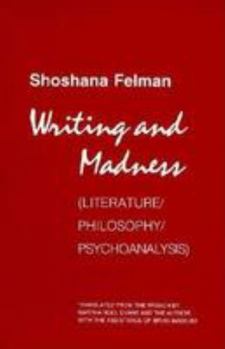Writing and Madness: Literature/Philosophy/Psychoanalysis
Select Format
Select Condition 
Book Overview
Writing and Madness is Shoshana Felman's most influential work of literary theory and criticism. Exploring the relations between literature, philosophy, and psychoanalysis through brilliant studies of Balzac, Nerval, Flaubert, and James, as well as Lacan, Foucault, and Derrida, this book seeks the specificity of literature in its relation to what culture excludes under the label "madness." Why and how do literary writers reclaim the discourse of the madman, and how does this reclaiming reveal something essential about the relation between literature and power, as well as between literature and knowledge?Every literary text continues to communicate with madness with what has been excluded, decreed abnormal, unacceptable, or senseless by dramatizing a dynamically revitalized relation between sense and nonsense, reason and unreason, the readable and the unreadable. This revelation of the irreducibility of the relation between the readable and the unreadable constitutes what the author calls la chose litteraire the literary thing."
Format:Paperback
Language:English
ISBN:0801493943
ISBN13:9780801493942
Release Date:January 1985
Publisher:Cornell University Press
Length:256 Pages
Weight:0.82 lbs.
Dimensions:0.6" x 6.1" x 9.0"
Customer Reviews
2 ratings
Highly recommended!
Published by Thriftbooks.com User , 16 years ago
An amazing and insightful book. Through literary texts by Nerval, Flaubert, Balzac, and Henry James, and engaging the work of post-structuralist thinkers Jacques Derrida, Michel Foucault, and Jaques Lacan, Felman examines the relationship between madness and language, literature, and philosophy. At issue always is the position madness occupies in Western thought, and the question of how madness gets caught up in the very words we use to describe it. This is a necessary read for anyone interested in literary criticism, post-structuralism, and/or psychoanalysis. Highly recommended!
Highly recommended reading
Published by Thriftbooks.com User , 16 years ago
This is perhaps Felman's most widely read book: her collection of essays called Writing And Madness (Literature/ Philosophy/ Psychoanalysis) which was published in French in 1978 and appeared in translation 1985. Writing And Madness, Felman notes in the reprint of 2003, is her most literary theoretical book, which still maintains its popularity even though she has worked in many other related areas, such as her key feminist text What Does a Woman Want? Writing and Sexual Difference (1993), and her work on testimony with Dori Laub in Testimony: Crises of Witnessing in Literature, Psychoanalysis and History (1992). Once more, in Writing And Madness Felman returns to and expands upon "the specificity of literature by exploring literature's constitutive relation to what culture has excluded under the label `madness' (nonsense, alienating strangeness, a transgressive excess, an illusion, a delusion, a disease)." In exploring these relations, Felman is able to interrogate modernity as the age of psychiatry, and its power-knowledge base, where literature functions at the margins, reclaiming and critiquing structures of dominance and exclusion. Richard J. Lane From, Fifty Key Literary Theorists (Routledge, 2006)





